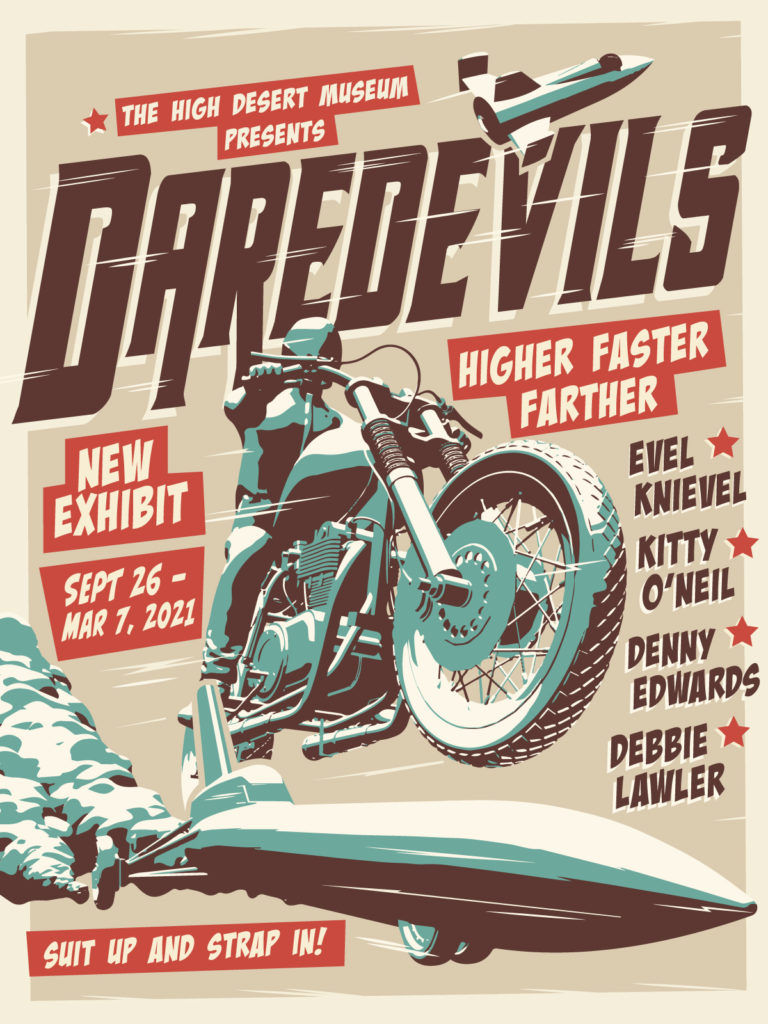Daredevils
September 26, 2020 through May 2, 2021
New exhibit celebrates daredevils that brought spectacle to the High Desert landscape.
On a cold December day in 1976, stuntwoman Kitty O’Neil stood poised on the dry lakebed of Southeast Oregon’s Alvord Desert to make history. In a hydrogen peroxide-powered, three-wheeled rocket car, she reached an average speed of 512 miles per hour, setting a new land-speed record for female drivers that held for more than 40 years.
O’Neil was not the first thrill seeker to seek challenge in the High Desert, with its deep canyons and expansive playas.
Daredevils, a new, original High Desert Museum exhibit, explores the meaning risk-taking plays in our lives, why daredevils capture our imaginations and the many reasons they have been drawn to High Desert landscapes to execute their feats.
The High Desert’s salt flats, former lakebeds and canyons have made it an ideal place for daredevils and risk-takers. This exhibit looks at the individuals who have tested the limits of what’s possible, attempting death-defying feats such as jumping over a canyon or going faster than anyone has before. It highlights some of the best-known daredevils of the 20th century, including Evel Knievel and O’Neil, considering how they became larger-than-life symbols of hope, freedom and independence during a turbulent time.
The playful, engaging exhibit includes objects from High Desert stunts such as the 1966 Triumph motorcycle jumped by Denny Edwards, known as “The Flying Irishman,” who performed throughout Oregon in the 1970s. It showcases the helmet and jumpsuit worn by O’Neil when she set the land-speed record in the Alvord Desert and the leathers worn by Oregonian Debbie “The Flying Angel” Lawler in 1974 when she broke Knievel’s record for the longest indoor motorcycle jump, traveling 101 feet and clearing 16 Chevy pickups.
“When Evel Knievel attempted to jump the Snake River Canyon in 1974, when Kitty O’Neil made history on the Alvord Desert two years later, the eyes of the world were on the High Desert and the remarkable landscape features that facilitated these adventures,” said Museum Executive Director Dana Whitelaw, Ph.D. “Daredevils revives those stories and explores why they have such appeal, even today.”
This exhibition explores the cultural significance of risk-takers against the backdrop of the 1970s, including the Vietnam War, an economic recession and an unfinished civil rights movement. It also dives into how they influenced culture: Some daredevils moved on to performing stunts in Hollywood. Daredevils also inspired more recent phenomena like the X Games.
“Daredevils” is made possible by
With support from
Click here to discover everything you need to know about your visit to the High Desert Museum!
“These daredevils were icons in their day, and the High Desert was a huge part of their success. Seeing the motorcycle jumped by ‘The Flying Irishman’ reminds us of the courage they exhibited and the human resilience they inspired.”
Co-curator of Daredevils and Museum Art and Experience Developer Dustin Cockerham





